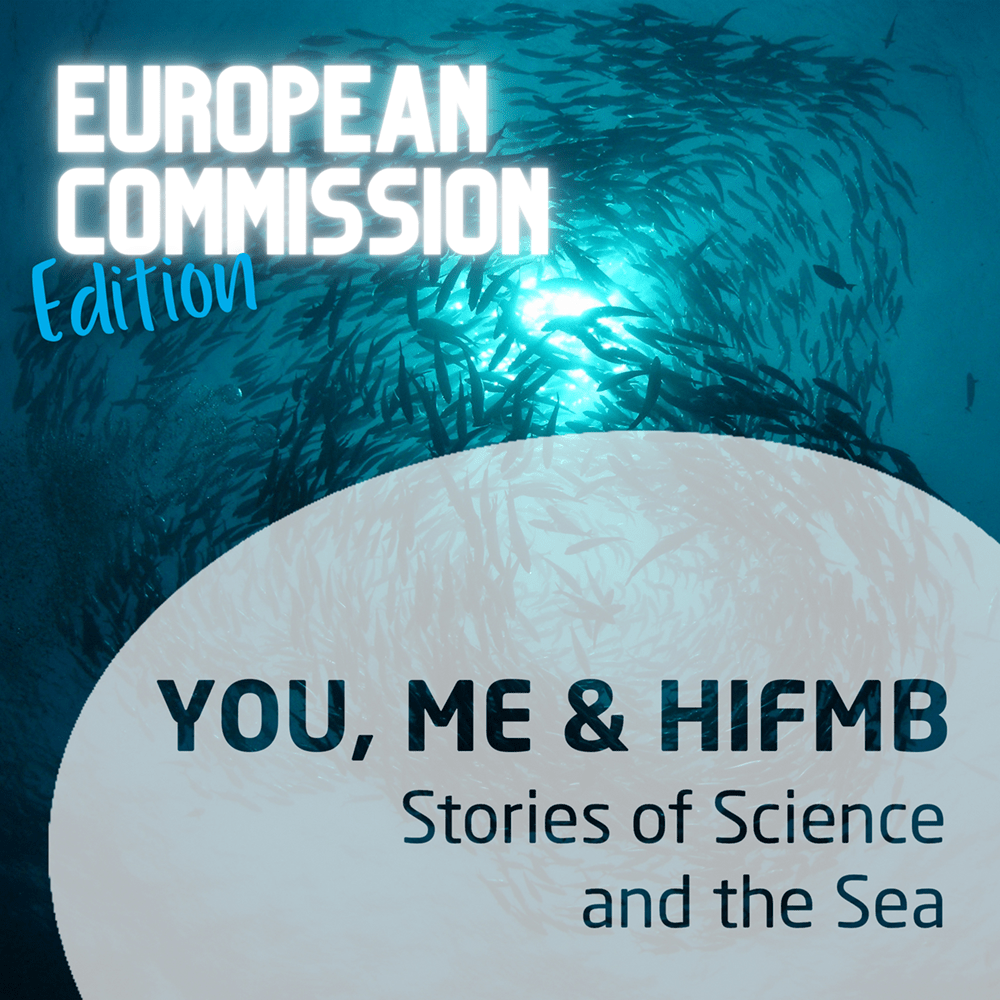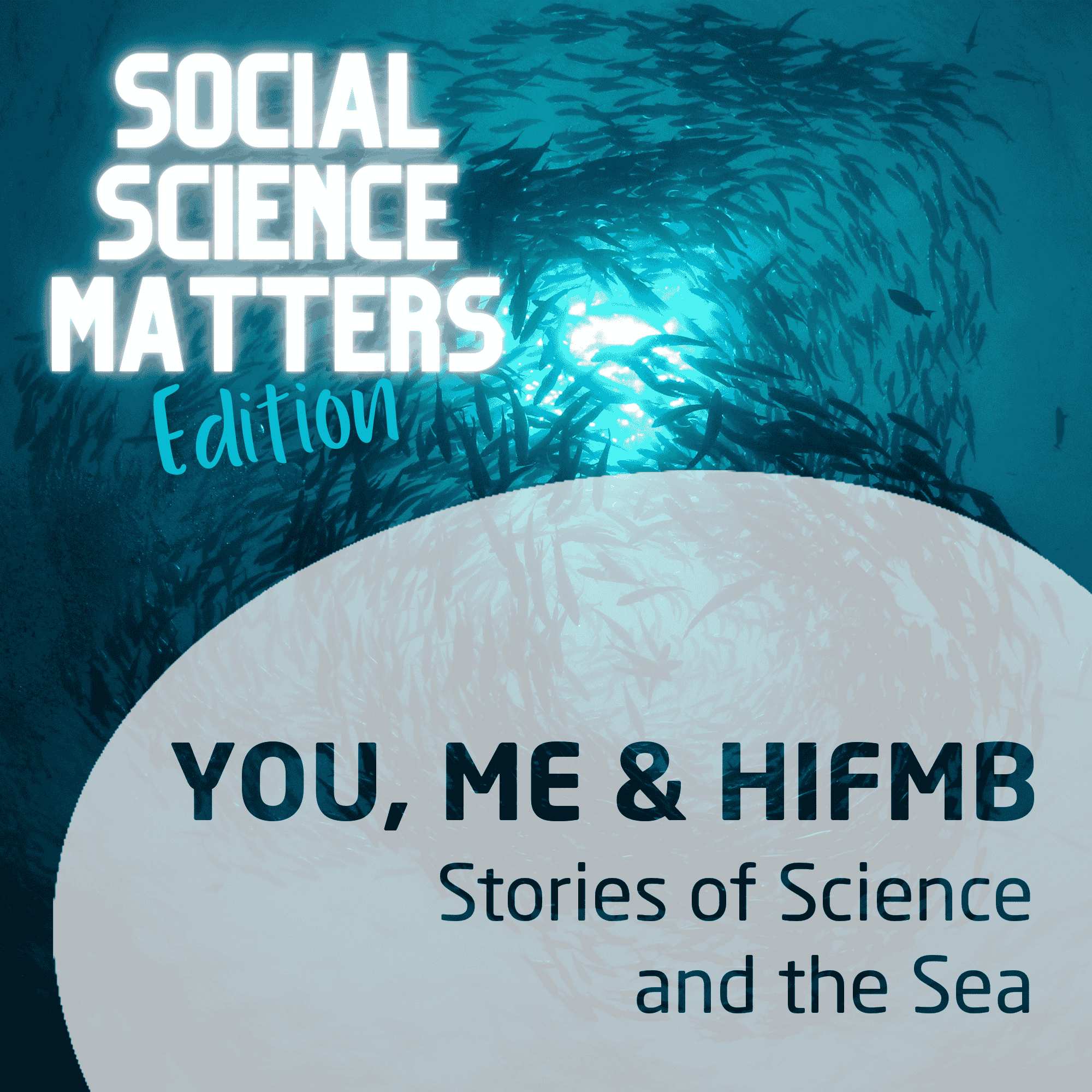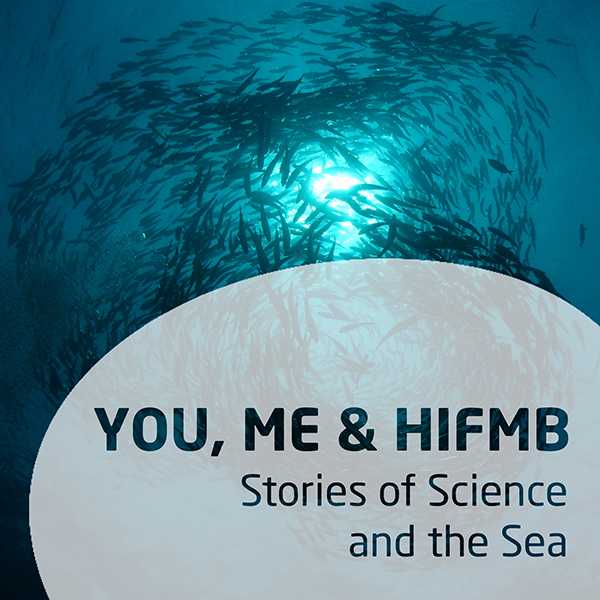In jeder Episode nimmt ein neuer Gast gegenüber von Jan-Claas Dajka Platz und spricht mit ihm über aktuelle Forschungsprojekte, kuriose Anekdoten sowie über Wege, Umwege und Wegbegleiter in der (nicht nur) wissenschaftlichen Karriere. Jan ist interdisziplinärer Postdoc im Bereich Meeresökologie und Marine Governance am HIFMB. Im Gespräch mit Ökologen, Geographinnen, Bioakustikern, Mathematikerinnen und vielen mehr zeigt er die interessanten und vielfältigen Persönlichkeiten hinter der transdisziplinären Forschung am HIFMB.
Der Podcast ist auf Englisch.
Den Podcast findet ihr neben zahlreichen weiteren empfehlenswerten Wissenschaftspodcasts bei Wisspod.
Neueste Episode: Daniela Portella Sampaio – From Brazil to Antarctica
In this episode, Jan welcomes Daniela Portella Sampaio for a conversation about her scientific journey through Antarctica and current research on Antarctic governance. We particularly focus on Antarctic intersectionality research. Daniela also shares memorable moments from the field (like finding a historic shoe) and tips on how to successfully score grants – she scored 2 (!!) Marie Skłodowska-Curie Fellowships! Tune in for a return to our regular interview-style format.
Enjoy the episode!
Alle Episoden
Sahar Stevenson-Jones – About the Society for Ecological Restoration Europe (SERE)
Today in another European Commission Edition episode, I talked to Sahar Stevenson-Jones. She is working at SERE (The Society for Ecological Restoration Europe) and there she is the Project Officer for the Marine Restoration Project.
The Marine Restoration Working Group was established at the SERE2024 Conference in Tartu, Estonia, and currently meets 4 times a year, with the 5 task forces, which are each focusing on unique objectives, meeting more regularly. The group is currently at 65 members, from across Europe, and includes researchers, practitioners, experts in finance and policy, as well as students. The group is chaired by Roberto Danovaro, and co-chaired by Joel Lindholm. Their primary priority is to adapt the SER International Principles and Standards, specifically the attributes tables of the Ecological Recovery Wheel, to the marine space. You can find out more here: www.ser-europe.org/mrwg.
Paris Vasilakopoulos – About the Knowledge Centre for Biodiversity (KCBD)
HIFMB’s Transfer Office was attending the Knowledge Exchange Network for Marine Biodiversity Cluster Event at the European Research Executive Agency (REA) of the European Commission (EC). Here in Brussels, I interviewed participants of the event – one of them being Paris Vasilakopoulos – today’s guest. Paris works at the EC, specifically the Joint Research Centre (JRC) and, among many topics, we talk about his role in the Knowledge Centre for Biodiversity (KCBD). Enjoy these short episodes of the podcast coming to you straight from Brussels!
Social Science Matters 03 – Before You Go Anywhere! Practical Concerns and the Matter of Ethics
This episode covers the essentials of social science research in terms of practical concerns and ethical considerations. It firstly spends some time, thinking about time! How researchers can plan projects within specific timeframes, budgetary constraints, possible travel restrictions, and how to also think on vital matters of risk, health and safety in doing social research. The podcast secondly shifts to ethical principles, discussing the importance of taking ethical approaches and engaging formal ethical procedures when working with human subjects. The episode considers matters such as informed consent, confidentiality, and minimising harm and how ethics is not just about forms and approvals but treating people with respect, ensuring their well-being, and building trust. We also offer ‘top tips’.
You can tag us on social media #SocialScienceMatters.
Social Science Matters Social Science Matters 02 – How to Start Thinking About Social Worlds
This episode shifts our focus to how we might start to think about social worlds in our research. It outlines that how we look at the world – the assumptions we hold about it (what exists, how we know what exists) – is crucial to our start points in research, and drives the kind of questions we might ask about the world. This podcast explores the role of theory (and how it is something we are all using, all of the time anyway!) and positions theory as a useful (rather than intimidating) framework for understanding and interpreting the social world. The episode further considers how theory – thinking about the way we view the world – can open space towards valuing knowledges beyond Western understandings. Finally we consider how the way we think about the world, what we want to find out about it, will also guide the kinds of research questions we ask about it, and choice of methods we engage.
Social Science Matters 01 – What is Social Science and Marine Social Science?
This episode tackles the fundamental question: What is social science, and why does it matter for marine research? We first (try to) define social science, discussing the various disciplines which constitute it, and briefly introduce the methods and approaches that will be discussed further, later in the series. We next discuss marine social science, its special and important place in the marine sciences more broadly, and how it can help us tackle important questions that the natural sciences can’t do alone. We furthermore outline the importance, then, of interdisciplinary work, drawing also on examples of our own projects.
Welcome to ‘Social Science Matters’
This episode welcomes listeners to the podcast “Social Science Matters,” which is dedicated to exploring the important world of social science research in the marine environment. In this episode we outline the purpose of the series, which aims to demystify social science methods and make them accessible to marine researchers, practitioners, and anyone interested in the human dimensions of the ocean.
Jan-Claas Dajka – Turning the Tables on the Podcast Host
In the new year, Kim Peters surprises podcast host Jan and turns the tables on him. She Interviews him on: what got him to HIFMB, a quick look into Jan’s work on marine biodiversity at the science-policy interface, the wonderful people he got to learn from and work with, and even the Olympics 2028!
Kristin Tietje – (Finally) Full-Time Science Coordinator
Kristin (or Tine) Tietje has not only got a super Northern-German sounding name but also recently got a full-time position as the science coordinator of the Marine Governance Group here at HIFMB. She talks about the long winding road that she took to get here and tells us what it means to coordinate science and, more importantly, scientists – which is why she enjoys her job so much.
Merdeka Agus Saputra – Tinny Perspective Switcher
Today, we hear from Merdeka, a PhD-student in the former Marine Political Ecology Group that is now part of the Marine Governance Group. He reports on his recent manuscript about tin mining by Indonesian divers and how he switches the perspectives in his writing to highlight topics that are otherwise forgotten about. Merdeka also reflects on what it is like to have children as a PhD student and how much he likes his neighbours in Oldenburg.
Anna Roik – Your Go-To Coral Microbiome Harnesser
In a thunderous summer episode, we hear from Anna Roik – postdoc at HIFMB. Her work is centered around harnessing the microbiome (the collection of bacteria, viruses, fungi and their genes) on corals. She transplants the microbiome of more heat resistant corals onto that of heat susceptible ones to boost their resilience in the face of climate change.
Jasmin Groß & Elena Schall – On the ”WissZeitVG” and Why There’s Need to Change the Changes
Jasmin Groß and Elena Schall – both representatives of the Postdoc-Team a the Alfred Wegener Institute for Polar and Marine Research – bring a hot topic to the podcast: the recently proposed law reforms surrounding the “Wissenschaftszeitvertragsgesetz”. This is a “Law on Fixed-Term Contracts in Higher Education and Research” and it is due for a change. Jasmin and Elena will present to us what is included in this change and why it has gotten a lot of negative backlash.
As a timestamp: The recording was done in May 2023 and does not discuss the most recent events in the week of the 5th of June 2023. #IchbinHannah
Mita Mahato – On Art as Science Communication and Her Very Old Cat
Mita Mahato is an artist who uses art to communicate environmental issues – especially via the use of comix – yes with an X! As our artist in residence in collaboration with the Hanse-Wissenschaftskolleg Institute for Advanced Study, Mita reflects on the work she has done during her time with us.
Dorothee Hodapp – On Motivation and the Bigger Picture
HIFMB postdoc Dorothee Hodapp is working on biodiversity change and is giving us insights into her recently published study in Global Change Biology. Here, she shows how climate change disrupts core habitats of marine species and predicts their ranges up to the year 2100. She further shares her recipe for successfully blending family life with two kids with a gapless CV in academia and her recent move into a permanent position in the sciene-policy interface.
Meren – About Mentoring in Academia and Average Bass Playing
Today we have Meren on the show. He is the leader of our institute’s Ecosystem Data Science Group and considers himself and his group to be placed at the intersection between microbiology and computer science. Mentorship is an imporant topic to him – we talk through his survey Mentorship in life sciences: voices of mentees, where he asked early career researchers how the mentorship that they received affected them and their academic lives. As always, we also talk about Meren’s very own academic live and how he got to where he is today. A super valuable episode for academic mentors and mentees alike!
Jana Massing – on Bacteria, Manifold Learning and Courage
Back from our winter break, we have Jana Massing on the podcast. Jana is a PhD-student in the Biodiversity Theory group and introduces us to her work on marine bacteria. Amongst her many interests, including food webs, modelling, governance and science communication, we chat about her recent paper. There she applies a manifold learning technique, called “diffusion maps” that allows her to gain insights into the functions that bacteria can play in the Baltic Sea.
Christmas Special – A Slightly Different Christmas Story
Gema Martínez Méndez reads her Scientific Fairytale “The Bremen Town Musicians set sail” from “Once Upon a Time – A Scientific Fairytale Vol. 1” that we introduced in Episode 11. Happy Holidays everyone!
Andrea Franke – Making the UN Ocean Decade workermany Drinking French Wine
In this Episode, postdoc Andrea Franke showcases her latest paper from People and Nature on real-world labs. She also shares with us how she expanded her research from specialised experimental work on herring larvae to transdisciplinary work on the UN Ocean Decade. A great example on how to build interdisciplinary recognition!
Lucie Kuczynski – Working on Artificial Islands in Exotic Germany Drinking French Wine
Lucie Kuczynski is a community ecologist working on global change and what it implies for biodiversity. One of her recent studies shows why the biodiversity crisis is too nuanced to be tackled in the same way as global warming. She also enlightens us why French wine is the best, why La Rochelle is the best city and why Academia is not the only career path for Academics. A lot of wisdom in this episode – don’t miss it!
Gema Martínez Méndez & Rebecca Borges – the Grimm Sisters for Scientific Fairytales
Today, it’s all about science communication! And for the first time, we have two guests: Gema Martínez Méndez, marine scientist, and Rebecca Borges, marine ecologist. Both are involved in a sci-comm project called “Once upon a time… a scientific fairy tale” where scientific studies are communicated via the use of fairy tales. Definitely give this one a listen!
Read the scientific fairytales here: www.marum.de/en/Discover/Once-upon-a-time.html
Intro and outro supported by the wonderful voice of Dr. Kimberley Peters and sound effects from quicksounds.com and pixabay.com.
Lukas Meysick – about Seagrass Superpowers
Lukas Meysick is a postdoc for seafloor ecology of the Wadden Sea. He also works on a recent project partnering with stakeholders from Tanzania and South Africa looking at how seagrass can assist in clearing polluted water. We further talk about his scientific career – in his PhD, seagrass also took centre stage. Enjoy this seagrass-themed episode with Lukas!
Soli Levi – on How to Add Emotion to Marine Governance
In this episode, Soli Levi tells us about a very new and unexplored study field: emotions in marine governance. Soli is developing a theoretical framework to bring emotion into management decisions and talks about her plan with case studies in Ireland. We also talk about Soli’s multifaceted past as a turtle conservationist and working with NGOs in Greece, remote work as a business development coordinator and so much more.
Solomon Sebuliba – Inventor of the “Bio Ocean”
Solomon Sebuliba considers himself a conservation biologist turned political ecologist who, in his PhD at HIFMB, looks as biodiversity as a concept. Specifically, he considers the inherent power that terms like “biodiversity” or “biological diversity” have. Through this, he came up with his own concept, the “Bio Ocean”. We also talk about Solomon’s deep and varied CV, working on the ICUN Red List, moving with his family from Uganda to Germany and much more. A must-listen!
Nina Tombers – Genetics Guru and Sound Smoothener
Master’s student and our very own podcast editor Nina Tombers chats about her experience of the Master’s career stage. We chat about her Thesis work on population genetics at the Centre for Marine Tropical Ecology (ZMT) in Bremen and her student assistant job here at HIFMB. She gives us a look into the behind the scenes of podcasting, Switzerland, tropical population genetics, her training to become a nature guide in South Africa and how she plans the future.
Sharlene Fechter – Searching for Stakeholders in Antarctica and a PhD in Australia
In this Episode, Sharlene Fechter talks about being a Master’s student at HIFMB. She covers her thesis work on stakeholders of the Weddel Sea in Antarctica and how she built a diverse skillset to jumpstart an interdisciplinary career in science. We also talk about how becoming a young mother early in her career motivated her even further and how she is currently searching for a PhD-position in Australia.
Irene Roca – Whistling Killer Whales on SD-Cards and More Soundscape Stories
HIFMB-Postdoc Irene Roca talks about her career as an ecoacoustician and introduces us to the fascinating world of soundscape ecology. And yes, this includes audio snippets of orca, humpback whales, fish and four seal species. Don’t miss this one, as Irene talks about her recent trip to Antarctica and the intricacies of behavioural science through sound.
Amelie Luhede – Interdisiciplinary Facilitator in Decision Making
In this one, we have interdisciplinary PhD student Amelie Luhede. She splits her PhD between the Faculty of Business Administration and Economics, University of Bielefeld and HIFMB to combine aspects of economics and environmental management. Through her quite young career, Amelie has switched fields often and has thus learned to appreciate switching perspectives in environmental planning. In her recent project, she is taking on the perspective of the decision makers and applies the economic concept “Value of Information” to find out how much it’s worth to gain information in a management decision. She applies this concept to a variety of systems in Northern Germany and (surely soon) beyond.
Ravi Ranjan – on Competition, Coexistence and Cold Winters
Today on the HIFMB Podcast, we have postdoctoral researcher Ravi Ranjan – a community ecologist working on complex models that explore the generation and maintenance of diversity. Ravi has a strong maths-background and applies it here to multi-species competition in phytoplankton communities. We talk about the history of species competition models, his move from India to Michigan, PhD programme differences between the USA and Europe, his work on snow leopards and much more.
Kimberley Peters – About Fortune, Failure and Something Special
In this episode, Jan-Claas Dajka interviews Prof Kimberley Peters, Professor for Marine Governance of HIFMB. She gives us insights into her vision for her newly formed Marine Governance group at the institute and dives (pun intended) into her most recent book publication, the Routledge Handbook of Ocean Space.
Through that, she discusses the value of publishing books vs. papers. She also opens up about the role of failure and fortune in an academic career and enriches the conversation with personal anecdotes from her life. A true storyteller at work!
Alica Ohnesorge – Species Detective Without Sorrow
Alica is a PhD-student in her final year and works on eDNA, a powerful method that collects DNA from seawater samples rather than from organisms themselves.
With this method, Alica is able to tell which organism has been present in the water column at a given time. She discusses the undeniable pros of the method but also how it is sometimes overestimated. In her relatively short academic career, Alica has worked in a broad background and she affirms how a good dose of bravery can lead to working in diverse places including Barbados, Australia, Seychelles, China and Denmark.
Josie Antonucci Di Carvalho – Snake Milker and Plankton Harmoniser
Josie works on the harmonisation of how phytoplankton is sampled in the German and Dutch Wadden Sea and we discuss her recent work in this EU-funded subsidy programme called “INTERREG”. Josie also has an exciting career path that led her out of and back into academia as she has a tonne of experience in working with wildlife stations in Brazil, her homeland, and Germany, where she lives now.
Intro and outro supported by the wonderful voice of Dr. Kimberley Peters and sound effects from quicksounds.com and pixabay.com.


